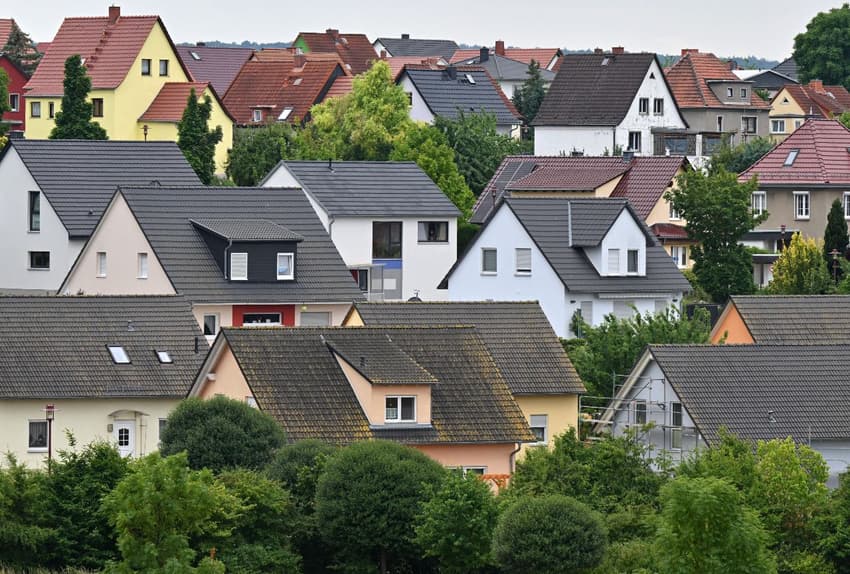Why is home ownership in Germany so low?

German-speaking countries have some of the lowest rates of home ownership in Europe. Why do so many choose not to buy? Here's what the experts have to say.
Germany and Switzerland are the only two countries in Europe with home ownership rates below fifty percent, with about 49.1 percent of people living in a household in Germany owning their own home.
That’s just one spot above Switzerland’s rate of 42.2 percent – and well behind other European countries with much higher rates of home ownership, including the UK, France and Sweden. These three countries have rates in the 65 percent range. At the upper end of the scale, more than three quarters of Spanish and Portuguese households are home-owners, according to Eurostat numbers from 2021.
Why so low?
Nick Mulder, Co-Founder and CEO of Hypofriend, a German-based mortgage broker that caters specifically to expats, says that’s because Germany’s high upfront fees create a different psychology around buying than in many other countries.
Switzerland, Germany and Austria have the lowest rate of home ownership in Europe. pic.twitter.com/IsfLHAdeiK
— Xavi Ruiz (@xruiztru) May 30, 2023
Buying in Germany comes not just with the price of the actual home, but with a land transfer tax that the buyer has to pay that varies depending on federal state. In Bavaria, this is three percent of the purchase price. In Brandenburg, it’s more than double this at 6.5 percent. Then come the notary fees and real estate commissions. All in all, the hidden fees of buying in Germany can end up totalling more than ten percent of the purchase price.
READ ALSO: EXPLAINED: What you need to know about buying property in Germany
Those fees make flipping harder, leading people to wait to buy their “forever home.”
“Homebuyers tend to buy for life,” says Mulder. “The notion of the property ladder is a foreign concept.”
Mulder says this motivates many people in Germany to rent for longer and wait to buy – so they only have to pay the high upfront fees once.
“This doesn't incentivise people to buy in cities, where apartments are more expensive and smaller, as it typically means moving eventually if they plan to have children,” Mulder adds. “The tenant-friendly environment makes renting quite attractive and much more flexible, especially since in Germany, you cannot easily cancel and/or repay your mortgage in the first 10 years.”

Due to stable house prices, many people have tended to wait to buy in Germany - that's becoming less possible due to rising prices. Photo: picture alliance/dpa | Christophe Gateau
Mulder also notes that the word “Schulden” – which means “debt” – also means “guilt” or “fault” in German, illustrating that many Germans still try to avoid taking on debt.
All these factors work together to create German homeowning habits that looks quite different to those seen in many other countries.
“Germans tend to dream of building their own homes to save on property transfer tax or wait to inherit a home, since the inheritance tax-free limits are rather attractive (from parent to child),” says Mulder. “Upfront fees typically mean that the breakeven of buying a home over renting is later, and therefore favours longer-term oriented buying.”
READ ALSO: EXPLAINED: the hidden costs of buying a house in Germany
Can people in Germany afford to wait to buy?
The waiting game in Germany, spurred on by high upfront purchase fees, has historically meant that the German market hasn’t seen the same highs and lows that the US and UK have.
“The market is rather sluggish and there have hardly been any significant price rises and falls in the last 50 years,” says Thomas Beyerle, a professor of real estate and Managing Director at Catella Property Valuation in Frankfurt.
Given the price increases of the last few years though, might buying become more urgent for those who can still afford it?
READ ALSO: Ask an expert: Is now a good time to buy property in Germany?
Beyerle and Mulder outline two possible scenarios.
“I don't think there will be a significant change to ownership - rather the opposite,” says Beyerle, who says the upfront fees are even more badly suited to the way people live now. “The younger generation is much more mobile than their parents and grandparents. They change jobs and cities more often - owning a property for their own use is becoming a ‘burden’ as buying and selling is associated with very high incidental costs.”
Mulder though, thinks home ownership in Germany could go up, depending on what the government decides to do about it.
“I expect this to change, either in the form of tax breaks for first-time buyers and/or a decrease in the property transfer tax. The finance minister has recently been discussing this,” says Mulder, referring to Christian Lindner’s recent suggestion that federal states abolish land transfer tax – at least for people who intend to use the property as their main residence, rather than as an investment. “But since it's regulated on a state level, significant coordination will be necessary.”
READ ALSO: What experts say will happen to the German housing market in 2023
Comments
See Also
Germany and Switzerland are the only two countries in Europe with home ownership rates below fifty percent, with about 49.1 percent of people living in a household in Germany owning their own home.
That’s just one spot above Switzerland’s rate of 42.2 percent – and well behind other European countries with much higher rates of home ownership, including the UK, France and Sweden. These three countries have rates in the 65 percent range. At the upper end of the scale, more than three quarters of Spanish and Portuguese households are home-owners, according to Eurostat numbers from 2021.
Why so low?
Nick Mulder, Co-Founder and CEO of Hypofriend, a German-based mortgage broker that caters specifically to expats, says that’s because Germany’s high upfront fees create a different psychology around buying than in many other countries.
Switzerland, Germany and Austria have the lowest rate of home ownership in Europe. pic.twitter.com/IsfLHAdeiK
— Xavi Ruiz (@xruiztru) May 30, 2023
Buying in Germany comes not just with the price of the actual home, but with a land transfer tax that the buyer has to pay that varies depending on federal state. In Bavaria, this is three percent of the purchase price. In Brandenburg, it’s more than double this at 6.5 percent. Then come the notary fees and real estate commissions. All in all, the hidden fees of buying in Germany can end up totalling more than ten percent of the purchase price.
READ ALSO: EXPLAINED: What you need to know about buying property in Germany
Those fees make flipping harder, leading people to wait to buy their “forever home.”
“Homebuyers tend to buy for life,” says Mulder. “The notion of the property ladder is a foreign concept.”
Mulder says this motivates many people in Germany to rent for longer and wait to buy – so they only have to pay the high upfront fees once.
“This doesn't incentivise people to buy in cities, where apartments are more expensive and smaller, as it typically means moving eventually if they plan to have children,” Mulder adds. “The tenant-friendly environment makes renting quite attractive and much more flexible, especially since in Germany, you cannot easily cancel and/or repay your mortgage in the first 10 years.”

Mulder also notes that the word “Schulden” – which means “debt” – also means “guilt” or “fault” in German, illustrating that many Germans still try to avoid taking on debt.
All these factors work together to create German homeowning habits that looks quite different to those seen in many other countries.
“Germans tend to dream of building their own homes to save on property transfer tax or wait to inherit a home, since the inheritance tax-free limits are rather attractive (from parent to child),” says Mulder. “Upfront fees typically mean that the breakeven of buying a home over renting is later, and therefore favours longer-term oriented buying.”
READ ALSO: EXPLAINED: the hidden costs of buying a house in Germany
Can people in Germany afford to wait to buy?
The waiting game in Germany, spurred on by high upfront purchase fees, has historically meant that the German market hasn’t seen the same highs and lows that the US and UK have.
“The market is rather sluggish and there have hardly been any significant price rises and falls in the last 50 years,” says Thomas Beyerle, a professor of real estate and Managing Director at Catella Property Valuation in Frankfurt.
Given the price increases of the last few years though, might buying become more urgent for those who can still afford it?
READ ALSO: Ask an expert: Is now a good time to buy property in Germany?
Beyerle and Mulder outline two possible scenarios.
“I don't think there will be a significant change to ownership - rather the opposite,” says Beyerle, who says the upfront fees are even more badly suited to the way people live now. “The younger generation is much more mobile than their parents and grandparents. They change jobs and cities more often - owning a property for their own use is becoming a ‘burden’ as buying and selling is associated with very high incidental costs.”
Mulder though, thinks home ownership in Germany could go up, depending on what the government decides to do about it.
“I expect this to change, either in the form of tax breaks for first-time buyers and/or a decrease in the property transfer tax. The finance minister has recently been discussing this,” says Mulder, referring to Christian Lindner’s recent suggestion that federal states abolish land transfer tax – at least for people who intend to use the property as their main residence, rather than as an investment. “But since it's regulated on a state level, significant coordination will be necessary.”
READ ALSO: What experts say will happen to the German housing market in 2023
Join the conversation in our comments section below. Share your own views and experience and if you have a question or suggestion for our journalists then email us at [email protected].
Please keep comments civil, constructive and on topic – and make sure to read our terms of use before getting involved.
Please log in here to leave a comment.